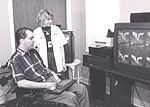

Home Computers Handle Daily Tasks for Injured Veterans
 |
| Click above for full photo |
"It makes all the difference in the world."
"Now I don’t have to depend on someone else for everything."
"It’s really been a lifesaver for me."
These are comments from three spinal cord-injured veterans about their environmental control computer system (ECS) during a recent interview with Federal Computer Week.
VA has provided these veterans with one of the newest versions of voice-activated ECS’s for their homes, to assist them in tasks that many people take for granted.
An ECS is designed for people who have lost the use of their upper-body, specifically their arms and hands.
Farris Hodges, Chief, Prosthetic Treatment Center at the Memphis VAMC, helps veterans obtain the unit. "The appropriate ECS can mean the difference between having around-the-clock caregivers and living alone, going to school and/or being gainfully employed. This technology can help put meaning back into life," he said.
The devices, which are approximately 5"x5"x3," help the veterans to accomplish tasks such as opening and closing doors, answering the telephone, adjusting and/or turning on and off lights, ceiling fans, televisions, stereos, air conditioning and heating units, and other electrical appliances, such as coffee pots, blenders and even hospital beds.
VA began developing ECS technology in the early 1970’s. The units then were functional but not user-friendly. They required the user to inhale and exhale on a "sip and puff" pneumatic tube to generate enough air pressure to signal the ECS electronically to perform preset tasks. Even though this older system controlled appliances and fixtures only in the room in which it was installed, it was a welcome assist.
VA was able to make ECS units available to SCI veterans who needed them through a contract with the Prentke Romich Company.
Today, VA no longer invests in the development of the ECS. After VA showed manufacturers the market need for ECS, they built on VA’s work, made improvements and created an entire industry, according to Saleem J. Sheredos, program manager of the Technology Transfer Section of VA’s Rehabilitation, Research and Development Service in Baltimore.
VA’s primary concern is to ensure that veterans receiving care at any of its 23 SCI Units are provided an ECS if they need it.
While still hospitalized in the SI Unit at the Memphis VAMC, veterans learn to use the ECS, which is connected to the television, radio, lights and bed controls. Their instructors are from the Memphis VAMC’s Prosthetic Treatment Center and Occupational Therapists of the Rehabilitation Service.
"Advancements in technology have provided a wonderful way to empower people," said Lisa Johnson, an Occupational Therapist who works daily with veterans in the SCI Unit at the Memphis VAMC. "The initial hospital rehab is only the introduction – the real test is getting out there and living. It gives me great satisfaction to hear that veterans are actively involved in life, going to school, working, and interacting with family and friends."
After home needs are identified and a unit is installed in the veteran’s home, the veteran receives between 8 and 12 hours training on how to use the system. Following this initial training, the Prosthetic Treatment Center staff will again contact the veteran to ensure that the unit is performing properly and to determine in further input is required.
For any future concerns or needed adjustments, Hodges said, "Veterans using these systems know that the VA is only a phone call away."
Article submitted and printed in the May/June 1998 Edition of Vanguard
By Willie M. T. Logan,
willie.logan@med.va.gov
Memphis VA Medical Center